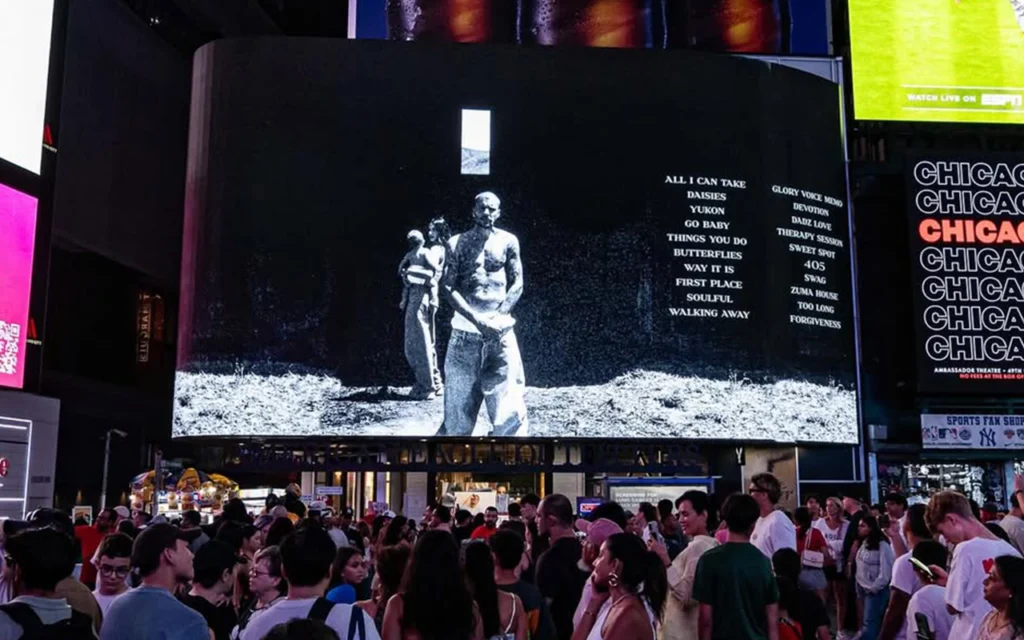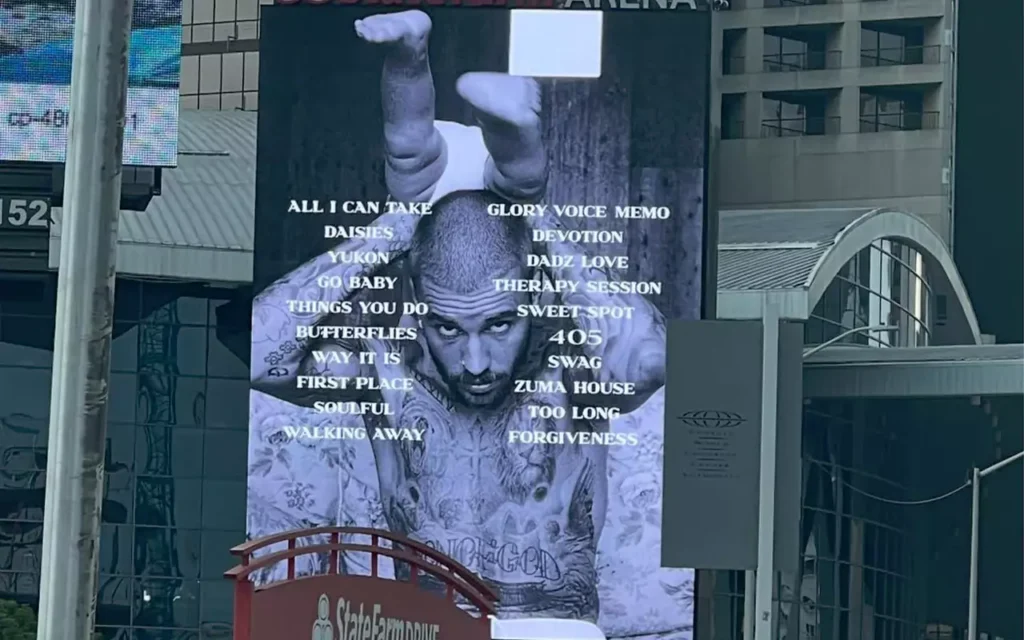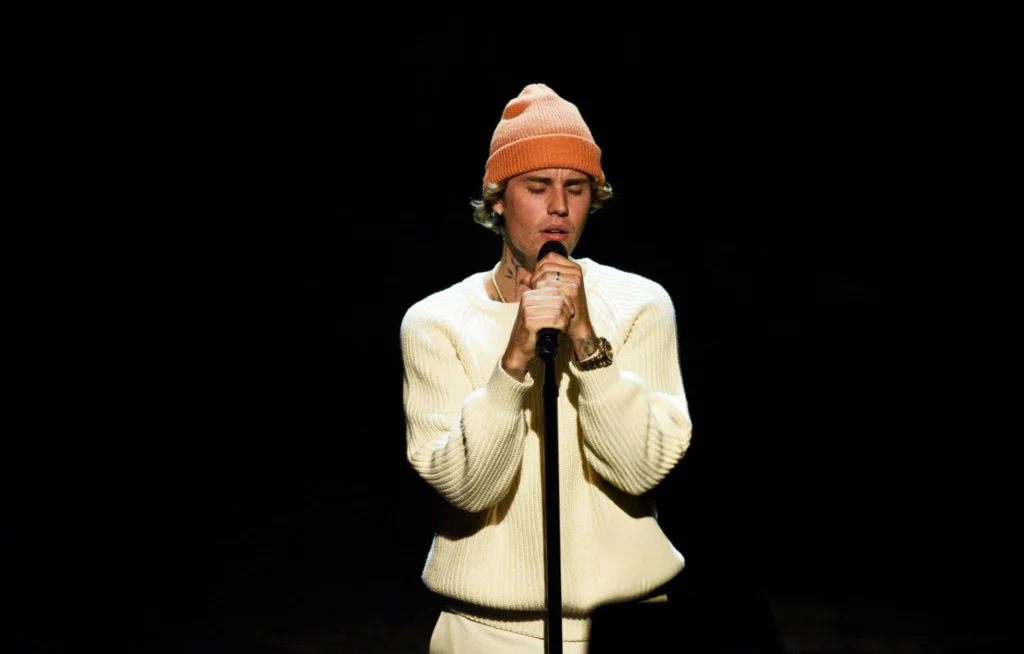Justin Bieber Is Back With a ‘SWAG’ That’s Breaking Records and Hearts
It wasn’t long ago that the internet was whispering about Justin Bieber like he was some washed-up ex-celebrity. Rumors flew: “He’s broke.” “He can’t perform anymore.” “He’s done.” And sure, from the outside, it looked rough. Justin had canceled his world tour, disappeared from the spotlight, and stopped showing up in the news for music—but instead for health updates and business troubles. His face had partially frozen from a nerve condition, he looked tired in public, and even his fans started wondering: is this the end of Bieber Fever?

But just when we all thought he was going to fade away into TikTok obscurity or become a stay-at-home husband to Hailey, he pulled a move no one saw coming. BOOM. Out of nowhere, SWAG dropped—no teaser, no countdown, no warning. Just a brand-new, 21-track album like a slap to the face of everyone who doubted him. The title alone was bold. SWAG. Not “Heartbreak.” Not “Redemption.” Not some deep poetic line. Just pure confidence.
The Album That Feels Like a Journal Set to Beats
When SWAG hit streaming platforms, it wasn’t just a music drop. It was Justin basically opening up his diary, hitting “record,” and letting the world listen. From start to finish, it felt like a wild ride through his mind. You’re not just hearing songs—you’re hearing confessions, late-night thoughts, and the emotional rollercoaster that is Justin Bieber’s life. There’s no sugarcoating. He talks about therapy, being exhausted, missing his kid, doubting his fame, and fighting to stay in love. One moment he’s singing like he’s at a wedding. Next, it sounds like he’s in a confessional booth.
And the features? They’re not just there for streams. Gunna brings his calm swagger. Sexyy Red explodes with energy in a way that makes you double-check you’re still on a Justin album. Even gospel icon Marvin Winans shows up. And somehow, it all fits. It’s not a mess. It’s a puzzle that finally clicks when you realize this album isn’t just for fans—it’s for Bieber himself. A way to heal. A way to speak freely. And a way to prove that even after silence, he still has something to say.

From “Broke Bieber” to Billion-Dollar Bounce Back?
Money talk around celebrities is juicy, and Justin Bieber was deep in the drama. Just last year, headlines screamed “Justin Bieber is broke!” after he canceled his world tour and sold the rights to his music catalog. Fans panicked. How does a guy with platinum records and global tours end up cashing out his biggest songs like a retiree pawning off Super Bowl rings?
The truth? That catalog sale was worth $200 million. But people forgot that cashing out doesn’t mean checking out. Behind the scenes, Bieber was planning something much bigger. SWAG is proof. It’s a comeback not just in sound but in strategy. The album has already racked up over 70 million streams on Spotify within the first day. That’s not small money. That’s major. He didn’t just drop music—he created a marketing machine.
There’s also serious talk about exclusive SWAG merch—limited-edition hoodies, hats, and even rumors of a custom SWAG game controller, which has gamers and Beliebers alike losing their minds. All of this means major cash flow, brand deals, and buzz again.
What makes it smarter? Bieber didn’t beg for radio hits. He built a universe. Every skit, every lyric, every soundbite feels like it’s building toward something bigger: a tour, a docuseries, maybe even a comeback movie. If this was chess, SWAG is Justin yelling “Checkmate” while sipping a green smoothie.
Sure, he’s not back to his Baby days where he ruled every chart—but this isn’t about teen fame anymore. It’s about adult strategy. Grown-man money. And finally doing it his way. So no, Bieber isn’t broke. He’s building a different kind of empire—and SWAG might be his loudest flex yet.
Critics Be Like: “Wait, This Is Actually Good?”
Here’s the tea: critics didn’t know what to expect from SWAG, because, let’s face it—Bieber hasn’t exactly been the critics’ favorite child in the last few years. Some said he lost his edge. Others believed he was coasting on past fame, putting out safe pop hits just to stay relevant. But then came SWAG, and now even the loudest Bieber haters are scratching their heads and—grudgingly—nodding.
That’s because SWAG isn’t just catchy. It’s complicated. It’s weird, soulful, honest, and a little messy—in the best way. Songs bounce between styles. One minute it’s pure R&B, the next he’s harmonizing over acoustic guitar, then you’re suddenly in a gospel revival. But guess what? It works. It’s not trying to be a perfect pop album. It’s trying to be real.
Take the track “All I Can Take.” It’s not a chart-chasing single. It’s a therapy session set to music. The production is raw. The vocals aren’t polished to the point of losing their soul. And that’s exactly the point. It feels like Justin recorded it at 2 a.m. when the lights were off and the demons were loud.
Then there’s the chaos of “La Vida Loca” featuring Sexyy Red. It’s wild. It’s chaotic. It’s hilarious. And yet, somehow, Justin blends it into the story of SWAG. Critics started comparing it to the emotional rollercoasters of Kanye West’s early albums or even Childish Gambino’s Awaken, My Love! in terms of creative risks. Those are big comparisons. And Bieber deserves them.
The only complaint? Some say the album might be “too much” for casual listeners. At 21 tracks, it’s a lot to process. It doesn’t follow the clean “hit-single-every-four-songs” formula. But maybe that’s the point. This wasn’t made to go viral on TikTok. It was made to sit with you, confuse you a little, then hit you hard when you least expect it.
Also Read:
Love, Loss, and Lullabies: Bieber Grows Up—Finally
Beyond the music and the madness, SWAG shows something bigger: Justin Bieber grew up. Sure, he’s still rocking oversized hoodies and diamond chains, but lyrically, he’s not that 16-year-old singing “One Less Lonely Girl.” This is a grown man who’s been broken, doubted, and humbled.
One of the most surprising tracks is “Dad’z Love”—a soft, emotional lullaby for his newborn son, Jack. In a world where rappers brag about money and cars, Bieber sings about sleepless nights, baby bottles, and the joy of watching someone take their first steps. It’s not just touching—it’s bold. Not many male pop stars open up like that.
Another standout? “Therapy Session”—where Bieber walks listeners through his battles with anxiety, self-doubt, and the pressure of growing up famous. No sugar. No “I’m fine.” He talks about crying in hotel bathrooms. About snapping at people he loves. About feeling empty while standing on massive stages. It’s like reading someone’s text messages during their breakdown—raw, uncomfortable, and real.
And the skits? Normally skits on albums feel like filler. Not here. Druski plays an exaggerated version of a concerned friend—asking Bieber “You good?” and Bieber responding with quiet sarcasm or silence. It’s funny, but it cuts deep. These skits aren’t there for jokes. They show how even when surrounded by people, Bieber can still feel alone.
By the end of the album, you don’t just respect Justin more. You understand him. You don’t have to be a Belieber to feel what he’s going through. That’s the magic. It stops being a celebrity story and becomes a human story. That’s what makes SWAG more than just an album. It’s a diary disguised as a playlist.

The Final Track: “Still Got It”—And Then Some
The last track on SWAG, simply titled “Still Got It”, ends with a whispered prayer. It’s not flashy. No beat drop. No feature. Just Bieber and a few soft keys. He thanks God. He thanks his fans. He even thanks his haters. It’s quiet, personal, and powerful.
And then he says it: “I’m still here.” Three words. That’s it. But in context, it hits harder than any stadium scream. Because he’s right. Justin Bieber is still here. After health scares, lawsuits, broken friendships, and social media storms, he didn’t just survive—he showed up stronger.
SWAG might not be for everyone. It’s not a playlist for your next pool party. It’s not designed to break TikTok records. But for those who’ve grown up with Bieber, who’ve seen him fall and get back up—this album is gold. It’s real. It’s raw. And it proves that sometimes, the most powerful comeback isn’t flashy. It’s honest.
So is Justin Bieber back? or He never really left?
